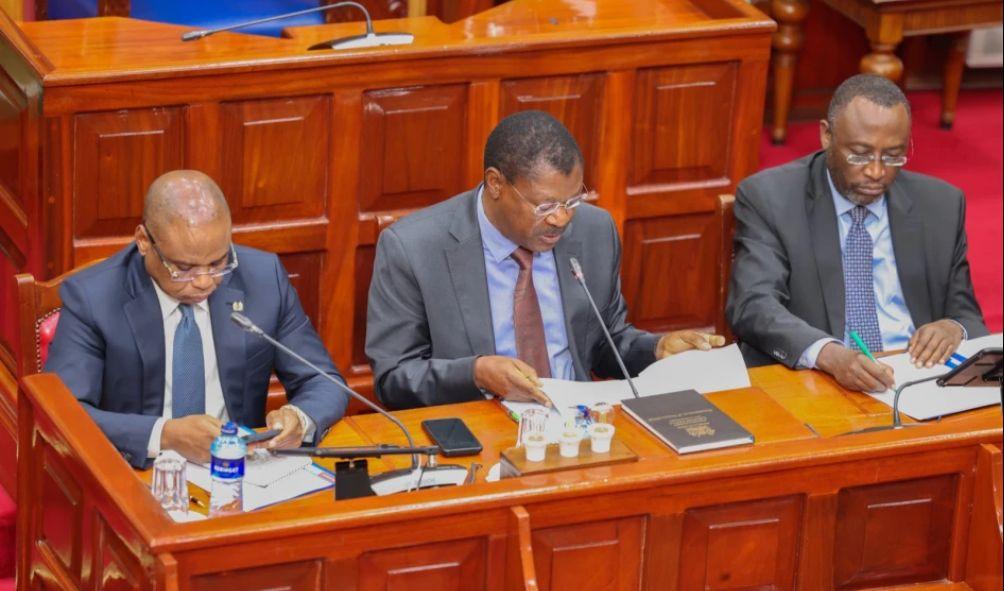Parliament Expels Journalists Following Protests, Raises Concerns Over Media Freedom
Following the recent ‘Occupy Parliament’ protests on the 26th of last month, the Parliamentary Service Commission (PSC) has decided to expel journalists from the precincts of Parliament.
This decision was conveyed by Moses Wetangula, the Speaker of the National Assembly, during a Wednesday morning meeting with the Media Council of Kenya, the Kenya Union of Journalists, and the Kenya Parliamentary Journalists Association.
Speaker Wetangula stated that the Media Centre has been ‘temporarily’ transformed into a storage space to accommodate items damaged during the protests.
Consequently, the PSC has designated a room adjacent to the Red Cross building as a temporary media center for journalists covering Parliament, a location considerably distant from the main Parliament building.
“The former media center has been repurposed into a storage facility to enable insurance assessors to evaluate the damage resulting from the protests. There was no other larger space available to house the damaged items,” Wetangula explained during the meeting.
He assured journalists that this arrangement was only temporary and that no journalist would be barred from covering parliamentary proceedings due to the recent events.
Wetangula further emphasized the commitment of the Parliamentary Service Commission to establish a modern media center within Parliament Square, aimed at better supporting parliamentary reporters in their duties.
Despite these assurances, journalists have encountered significant challenges in covering Parliament since the protests. Access remains restricted to certain areas of Bunge Towers and Continental House.
Duncan Khaemba, Chairperson of the Kenya Parliamentary Journalists Association, acknowledged the difficulties but stressed their resolve.
ALSO READ:
- April 2025: hottest sports events on 1xBet
- Muturi Labels Adan Mohamed as Ruto’s Poster Boy for Deals Behind the Scenes in Sh129 Billion Scandal Involving Russians
- SEX SCANDAL AT THE ICC: Top Prosecutor Karim Khan Accused of Sexual Misconduct and Vicious Retaliation Against Staff
- Kimani Ichung’wah Urges Tharaka Nithi to Support Ruto’s Second Term for Kindiki’s 2032 Presidency
- Ndii Responds After Muturi’s Revelation of Ksh129B Russian Deal: “AG Doesn’t Sign Agreements”
“Freedom of the media, as guaranteed under Article 34, and the right to access information for every citizen under Article 35, must and will be protected at all costs,” Khaemba declared.
“Parliamentary journalists have a crucial role in informing and educating the public on parliamentary activities that affect society. As the KPJA, we recognize this vital responsibility and will remain vigilant,” he added.
Journalists have voiced concerns that Parliament may use the protests as an excuse to infringe upon their constitutional rights. Samuel Owino of the Nation newspaper expressed his suspicion, stating, “It’s unfortunate that out of all the available spaces, Parliament chose the media center for storage.”
“This seems like the first step towards completely barring media from the Parliament precincts, which goes against Article 118 of the Constitution. They are testing boundaries,” Owino concluded.
Josephat Thiongo, who covers Parliament for the Standard newspaper, criticized the PSC’s decision, calling it misguided.
“The PSC’s decision to relocate the media to the outskirts of Parliament and deny them access to the precincts not only undermines media freedom but violates it. It is troubling that the existing media center has been converted into a storage facility,” Thiongo remarked.
Parliament Expels Journalists Following Protests, Raises Concerns Over Media Freedom
